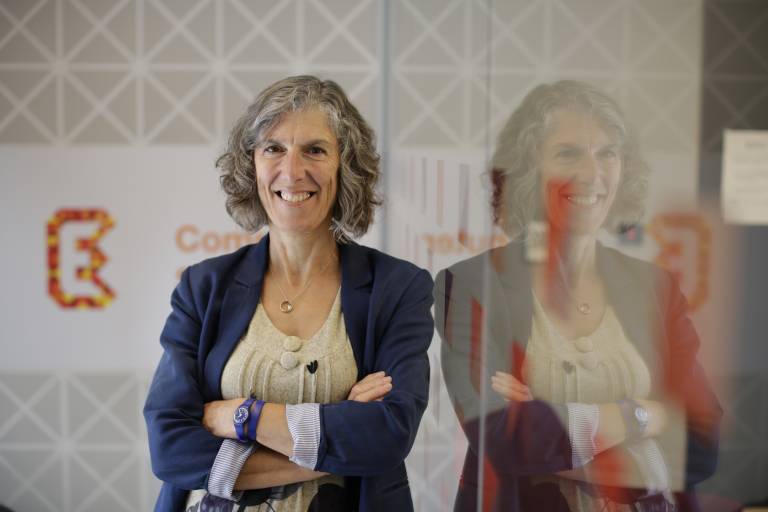Spotlight on Prof Ann Blandford
10 December 2019
Prof Ann Blandford is UCL Institute of Healthcare Engineering's Digital Health Deputy Director.

Prof Ann Blandford (UCL Computer Science, UCL Interaction Centre) is our Digital Health Deputy Director. As Professor of Human-Computer Interaction, Ann specialises in evaluating how complex digital systems are used and interacted with. Her research recognises and works with the inherent 'messiness' of the real world, particularly the way that systems such as medical devices, smartphones, wearables and computers interact with the people that are using them. Ann's position within the Institute of Healthcare Engineering provides a vital and exciting role in bringing together UCL's communities in digital and medical technologies.
Here we take a deeper dive into her thoughts about the future of digital health, her role within the Institute and the biggest challenges and lessons of her career.
What would you like the public to know about your research?
Most healthcare technologies are less usable, engaging, effective and safe than they could be. An important reason for this is that insufficient account is taken of the intended users and their situations when designing and deploying systems. Every one of us is different, so it can be hard to generalise, but my research focuses on how to better understand the intended users of technologies and how to feed that understanding back into design. Technologies are commonly designed for “work as imagined”; my research focuses on “work as done”.
I work across what can look like very different areas: intravenous medication administration; technologies for surgery; managing chronic conditions; sexual health; managing wellbeing; and more. I study the work of both health professionals and the general population (which includes, but isn’t limited to, people who might reasonably be called “patients”). The common themes are that we work with health professionals, patients and other technology users to understand user needs and practices. Also, that we test and extend theories of people and interactions (e.g., of engagement, human error, sensemaking) to inform technology design.
What is the patient impact of your research / how does your research work towards helping society?
I would love to say that by involving clinicians and patients in all our research we see a really rapid impact of our research on their experiences. But the truth is that most problems in healthcare are complex and it’s really hard to design good technology to address complex problems. So teams I’ve worked with have had direct impact in some cases – e.g., the design of the Contraception Choices website, or the Empowering People through Informed Choice in HIV (EPIC-HIV) apps – but in others we’re delivering theory and understanding that should have an impact on practice over time. For example, in the ECLIPSE project, which aimed to address the question: “does the implementation of Dose Error Reduction Software in intravenous medication administration improve patient safety?”, our conclusion was “it depends”. We’re working with policy makers and manufacturers to better understand how to translate this finding into policy and practice, but it’s a long journey.
What is the most valuable lesson you’ve learnt during your career so far?
Every day is a school day, so I’m learning constantly. Because I work across different areas of healthcare, it’s very easy to be aware of all the things I don’t know, the science I don’t understand. I have sometimes struggled to articulate what I do know, because I assume that it is as obvious to clinicians and patients as it is to me. One valuable lesson is to value my own expertise as well as that of others.
What has been the biggest challenge of your career so far?
Every paper rejection, grant proposal failure, and negative student feedback is hard to deal with. Every moment when you’re trading off the demands of family with the demands of work is guilt-inducing. But the biggest challenge for me was holding everything together in a year when I had substantial leadership roles within UCL and also nationally while my parents’ dementia was reducing their ability to live independently and other close family members were also dealing with significant health issues. I felt as if I aged a decade in that year. I still haven’t regained the energy I had before that year, but I have learned to say “no” a lot more assertively.
What is the highlight of your career so far?
I’ve been very fortunate: there have been many high points. I still get a thrill from having a paper accepted or a grant awarded or good student feedback. Don’t all academics? But the biggest thrills come from gaining insight: from realising or understanding something that hadn’t been obvious to me before. This usually happens in conversations with peers and students. The collaborations which help me see the world in a subtly different way together add up to the highlight of my career.
Where do you see your field of research in 10 years, in terms of scientific developments and advances?
There are many possible futures. There’s a utopian one where we have learned how to enable people (often supported by technology) to live healthier and happier lives, and where people share data securely with trusted parties to advance our understanding of the determinants of health. There’s a dystopian one where technology adds to the burden of self-care, where it disrupts clinical practices, and where people’s privacy, safety and comfort are compromised through poorly designed systems. The most likely future lies between these extremes, where we’ve made substantial progress on tractable problems but relatively little on complex ones. I hope that we will have the courage to address the complexity of healthcare management, and design and deploy novel technologies that are not “disruptive” but that are quietly transformative in improving people’s lives.
Still want more? Ann was on the latest episode of The Economist Intelligence Unit's Digital Economy podcast discussing the complexitiy of integrating digital technology into healthcare systems and pathways forward. Listen now on Apple podcasts.
 Close
Close

